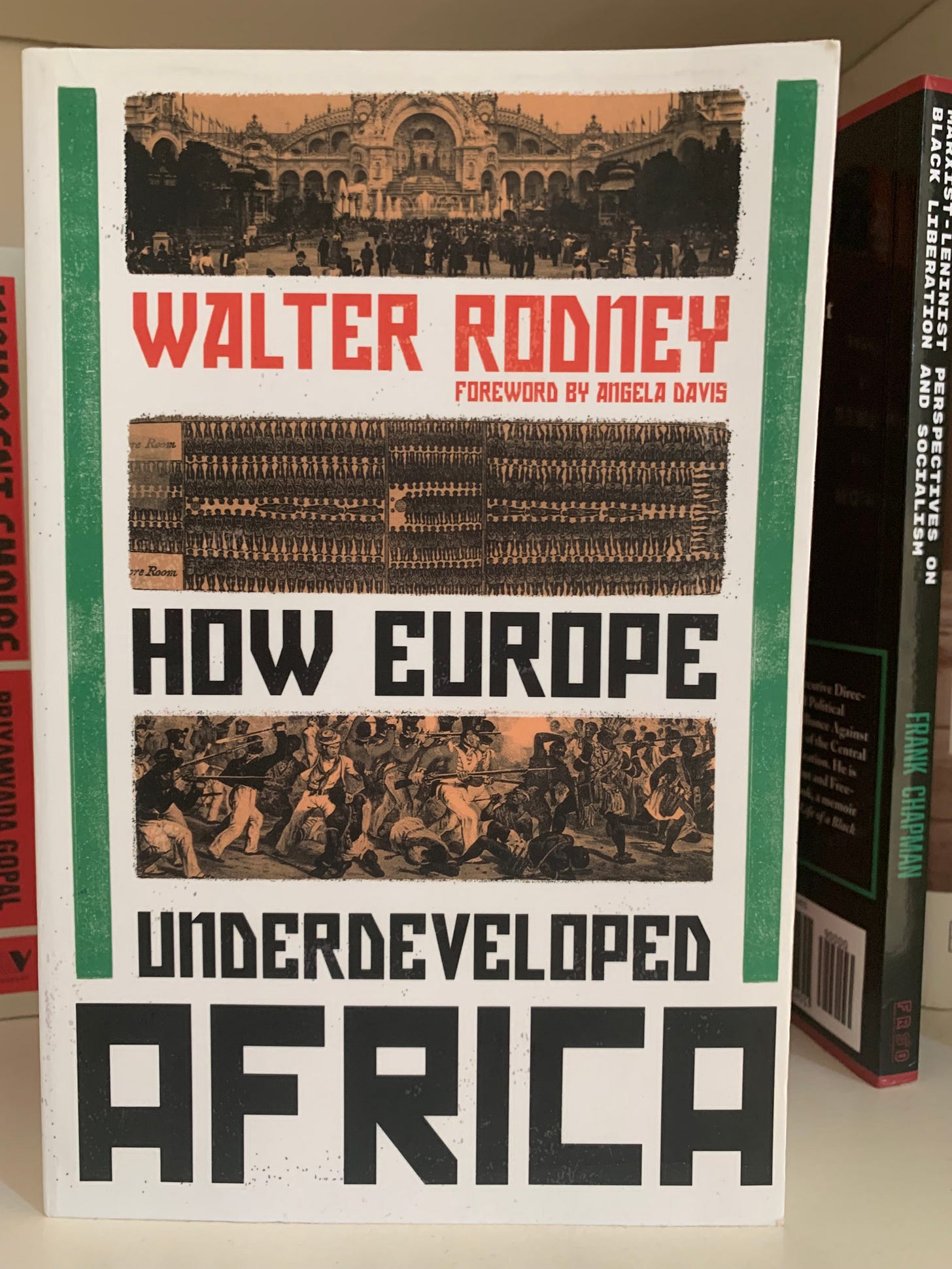Book recommendation: Walter Rodney's How Europe Underdeveloped Africa
basically, you aren't shit if you didn't read any Rodney
I’ll keep this book review short. I do plan on expanding on why I love Rodney so much on a later post. But for now, all I have to say is read Walter Rodney’s How Europe Underdeveloped Africa. Read it, right fucking now.
Walter Rodney was an Afro-Guyanese scholar. He was a Marxist scholar and also, an organizer. He would, unfortunately, be assassinated while back in Guyana after spending time abroad in parts of Africa, Tanzania to be exact, where he’d been teaching at the local university there. This was around the ‘60s, and ‘70s when he was in Tanzania, providing students from across the West African region lessons on Marxism, political economy broadly (how politics and the economy are related), and on identifying why parts of Africa were in the situation they were in, and what could be done to change that.
I’ve begun to more recently, lean more heavily toward Rodney than even Fanon in terms of someone I think people should read more. Fanon is still a hero of mine, given he too actively took part in struggle and his political vision had him wrestle with concepts like solidarity and violence in ways that are both fascinating and insightful. That said, Rodney, especially this text, was far more materialist (he really dealt with the facts on the ground, using history and such) and in some ways, more ambitious.
In How Europe Underdeveloped Africa, Rodney provides an overview of African history first, pre-European colonization. He focuses again on West Africa, since that’s the region from where European colonization first took place, and where the transatlantic slave trade commenced, the horror of the 16th, 17th, 18th centuries. The history can be a bit dense, but I oftentimes just push through, and still manage to gain some useful insights here and there that I wouldn’t have gotten from some other scholar, even more contemporary. Remember, this text was published decades ago, and Rodney himself would be assassinated in the 1980s in his thirties.
Still, he manages to be concise and providing a window into reality as such, a window that we need to peer through even in our own time to understand what was. Just because we’re in 2022 doesn’t change the fact that the Europeans had colonized Africa over several generations, first creating trading posts, setting up trading routes. The Europeans conducted eventually a divide and rule approach, reinforcing existing tensions between West African kingdoms, poisoning relationships past the point of no-return. Over time, the Europeans would create companies that would do this kind of work of pitting one groups against another, and in creating dependencies. Basically, the kingdoms would become puppets of the Europeans, and masses of Africans were used as labor, and their land as land to be extracted from.
In the next half of the text, Rodney explores European colonization at its peak, in the “modern era”, which was from the 1900s up until 1950s. Here, European control has been firmly established. Relations of dominance and oppression have been set between European companies and the masses of Africans. Once again, it is European corporations that lead the way in terms of extraction and exploitation.
This is key, since formal independence can be achieved, i.e. a country pushing out European direct control over a country’s political situation, but still have forms of neocolonial rule exist. Basically, as Rodney points out and warns against, you have some nations decolonizing whereby the people who run the government are now Kenyans, Nigerians, Senegalese, but are dependent still on European companies in terms of maintaining a “secure” economy. Essentially, European companies are still the dominant economic force in society, and thus, continue to extract resources and continue to be the main source of income and support for most Africans, including peasants (who to Fanon represent the true revolutionary force, which is kinda debatable to be honest).
In the end, what is needed for African nations to be truly independent is a socialist revolution following political independence. The European companies, a
nd private capitalist interests overall (a.k.a. business) must be uprooted from society. This will cause some suffering, truth be told. And there must be ways to mitigate this suffering (can it be completely avoided? I don’t know). But nonetheless, a socialist revolution must entail the creation of programs and government institutions that can provide for people as the economy transitions, and more importantly, there must be unity across several African nations. A socialist revolution in just one country, as Lenin also predicated, cannot be the way ahead for socialism generally.
I can say a lot more about this book. But I encourage you to read it yourself. Again, it’s a great primer on some African history, and is also a good insight into Marxist thinking on issues of decolonization. If you have any questions about concepts in the book, feel free to comment as well.



